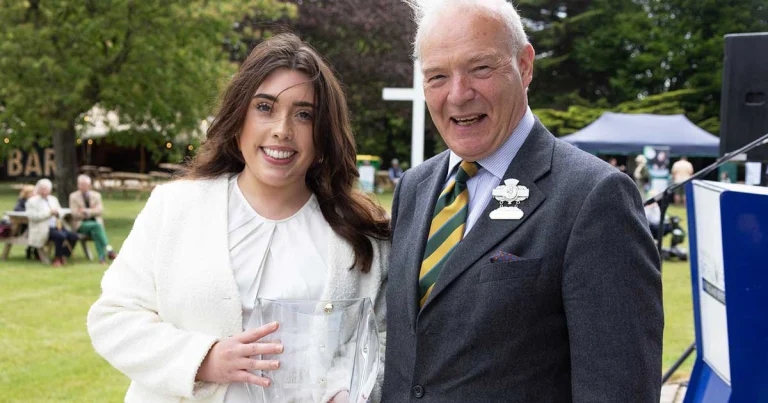16 Sept 2025
Details of an award programme for vet students, open to anyone in their final year at a UK veterinary school.

Georgia Owen with Royal Bath and West Society president Robert Drewett.
Farm Vet of the Future winner. Sounds impressive doesn’t it? And, in the three years that the competition has run, it has attracted some equally impressive and varied entries from students studying at all of the UK’s vet schools, writes Charlotte Grime.
Set up with the Royal Bath and West Society to honour vet Peter Clark, who was livestock vet to the Royal Bath and West Show for many years, and with sponsorship funding from Boehringer Ingelheim, winners receive a prize of £1,000.
Open to anyone in their final year at a UK veterinary school, the requirements are to submit both a piece of existing course work demonstrating knowledge of farm animal medicine and surgery and up to 500 words on the role of the farm vet of the future.
Shortlisted entries are interviewed by a panel of four experienced farm vets to determine the winners.
Paddy Gordon, RCVS council member and judge, said: “In the three years that the award has been running, we have been thrilled to attract entries from candidates with farming and non-farming background or experience.
“The decision to pursue a career in production medicine may be an obvious choice for some vet students, while others come to it after seeing practice or spending time on farm. As someone who has worked in farm practice for more than 30 years, I can attest that the work is rewarding, very varied and, while tough at times, ultimately establishes long and deep connections with the local rural community.”
Vet Becca Cavill, from sponsors Boehringer Ingelheim, said: “The Farm Vet of the Future award is a great way for vet students to capitalise on work they are already doing and share their vision for the profession. Boehringer Ingelheim wholeheartedly supports the initiative and we thoroughly enjoy reviewing the entries and meeting finalists and winners.”
In her submission, Dani McLaughlin, from the RVC, who was runner-up in 2025, focused on how farmers and farm vets must work as a united cohesive team to address issues on farm.
She also made the case for advocating for, and supporting, the farmer’s overall mental health as new challenges emerge.
With new and re-emerging diseases, such as bluetongue, and significant pressure on farm businesses, Dani explained that by vets being proactive in their own learning, they were well equipped to advise farmers, while simultaneously taking a burden of worry from them.
By being attuned with the farmer’s mental well-being, resilience and in-tune with what makes them tick, vets can also push the industry in the direction of supporting more sustainable farm practices and help reduce negative impacts to the environment that may affect farming long term.
Overall, she wanted to shine a light on how much change and support can be achieved through building true relationships between farmers and farm vets, concluding this was what the goal of rising veterinarians should be.
Dani’s academic study was around the welfare of dairy cattle and involved measuring cow interactions with salt licks that were installed using different mounting techniques. The licks were present for the purposes of environmental enrichment.
Among her findings were:
Abigail Hunt, who now practises at Delaware Farm Vets in Somerset, discussed the importance of vets using a one health approach to promoting sustainable practices, while also maintaining an efficient and healthy herd.
The one health approach recognises the interconnectedness of human, animal and environmental health, particularly within agricultural settings. It acknowledges the significance of antimicrobial resistance that results from the overuse of antibiotics in food-producing animals and stresses the importance of the responsible use of antibiotics on farm.
Abi highlighted the significance of the link between food safety and environmental health, and the role of the vet in both.
She also spoke about the importance of good communication between vets and clients. Empathy, and understanding the challenges faced by farmers, has a role to play in helping develop relevant and practical protocols for the successful management of disease on farm.
Abi’s entry was a herd health report on a Neospora outbreak she saw on a farm while on rotations. Picking out key learnings, she talked about:
Georgia Owen, from the RVC and winner of the 2025 award, submitted findings from a research study evaluating the impact of blindfolding calves on different aspects of their behaviour and procedure time during cautery disbudding.
Findings included:
When talking about the role of the farm vet of the future, Georgia referred to her own experience. From a non-farming background, she made the point that experiencing farm practice through EMS and placements lit a spark for working with farmers and their stock, and paved the way for her to decide to focus on working in production medicine.
Key characteristics of being innovative, adaptable and proactive and being unafraid to break the mould were highlighted as important.
She also referred to the challenges the farming industry is set to face in the future, including climate change, changing agricultural policies, labour shortages and a desire for more sustainable farm practices.
An involved vet with a fresh set of eyes and a new perspective to tackle these issues head on will be an asset to any farm.
Building on this, Georgia stressed the importance of strong communication and evidence-based approaches for improving animal welfare and empowering farmers to make informed, sustainable decisions amid changing industry demands.